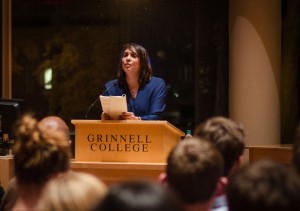By Silvia Foster-Frau
fosterfr@grinnell.edu
Yesterday, Writers@Grinnell brought Natasha Trethewey, the 19th U.S. Poet Laureate, to campus. She led a roundtable discussion at 4:15 p.m. and gave a reading at 8 p.m. in JRC 101. Shanna Benjamin, English, introduced Trethewey.
“Natasha Trethewey’s poetry teaches. Her insights instruct, and with each pen stroke, each typed page, she invites us to reckon with our demons, deeply, and to wrestle with the words that emerge from such engagements,” Benjamin said. “She is a national treasure. She is our native guard. Natasha Trethewey, my friends, is the truth.”
Trethewey’s poetry reading was both personal and relatable. First, she read poems from her novel Bellocq’s Ophelia, which won a Notable Book award by the American Library Association. Ophelia is a fictional prostitute based on Trethewey’s research on the red-light district in New Orleans in the early 1900’s. Subsequently, she introduced her poem “Genus Narcissus” from her book Native Guard by explaining that she had to learn about the nature of daffodils before writing the poem. Research, it turns out, is an important step in much of Trethewey’s work.
“[Trethewey] mentioned doing research for a poem: she researched that poem about daffodils. I thought that was interesting. I was like, ‘oh right!’ Poets just don’t know all of those allusions that they throw in… It just didn’t occur to me to write a poem that relates more concretely to the literary canon” said Sarah Farbman ’15. “I always think of poetry as personal experience off the top of your head, but it’s a lot more legit.”

Similarly, Trethewey explained how the writing process is also a learning process before reading the poem “Limen.”
“One of the joys of poetry is that you learn when you’re writing it. I didn’t know this word, the title of the poem, before I wrote the poem. I had to figure it out… The word is ‘limen,’” Trethewey said.
Trethewey was born in Gulfport, Miss. Her parents divorced when she was 6 years old, so she spent time growing up in both Georgia and Louisiana. Her readings revealed both her intimate struggles of her mixed race family and memoirs to her parents and shared a unifying theme of her drive to record the special moments in life.
“Her poems dig beneath the surface of history—personal or communal, from childhood or from a century ago—to explore the human struggles that we all face,” said James Billington, Librarian of Congress, in his announcement of Tretheway as Poet Laureate.
Additionally, Trethewey won the 2007 Pulitzer Prize for her novel Native Guard. She has received several fellowships from institutions including the Guggenheim Foundation, the National Endowment for the Arts, the Rockefeller Foundation Bellagio Study Center and the Bunting Fellowship Program. Trethewey currently teaches English and creative writing at Emory University in Georgia.
Professor Dean Bakopuolos, the force behind Writers@Grinnell, encouraged students to attend two upcoming events. Tomorrow, Rick Bass, author and activist, is offering students a unique opportunity to form an environmental connection with Grinnell. After a 9:30 a.m. walking tour at CERA entitled “Reading the Landscape,” Bass will host a discussion surrounding the Keystone XL Pipeline protest in the Drake Library at 2:00 p.m. Furthermore, Writers@Grinnell is hosting a convocation concerning gender inequality this upcoming Wednesday at noon with columnist and scholar Katha Pollitt. For more information on both of these events, see the Campus Memo.
“The Poet Laureate Consultant in Poetry to the Library of Congress serves as the nation’s official lightning rod for the poetic impulse of Americans,” according to the Library of Congress. Yesterday, Grinnell had the honor to host the leading poet in the United States: Natasha Trethewey.


















































